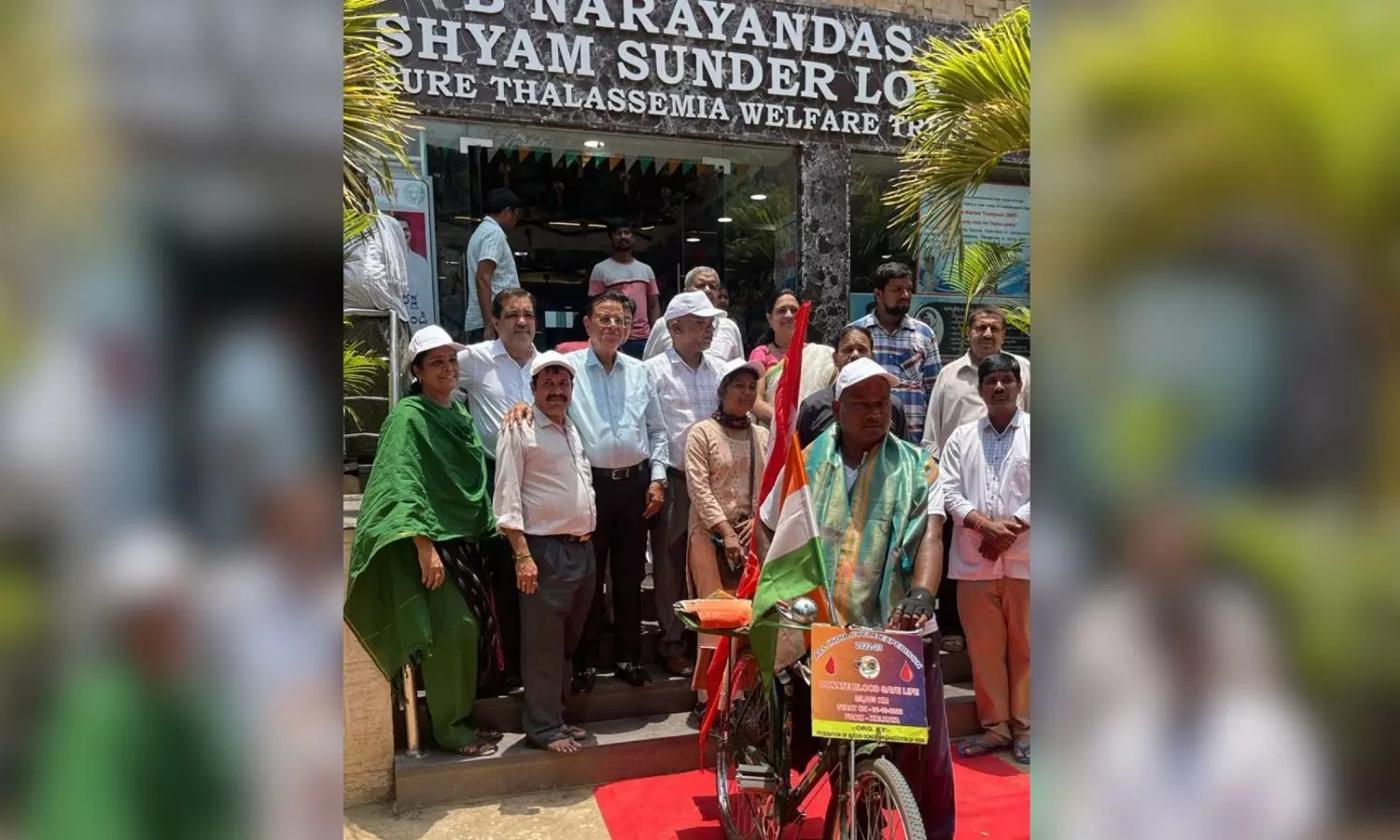Meet Joydeb Routh, who is cycling across India to raise awareness about blood donation
Routh plans to keep up his arduous efforts and travel an additional 10,000 km.
By Anoushka Caroline Williams
Hyderabad: A well-known philanthropist has embarked on a nationwide bike journey to raise awareness about blood donation.
Joydeb Routh started his voyage on October 1st, 2022, in Kolkata, and has already travelled 15,000 km. In the future months, Routh plans to keep up his arduous efforts and travel an additional 10,000 km.
On May 18, Joydeb Routh visited the Thalassemia and Sickle Cell Society (TSCS) in Shivrampally, Hyderabad, as part of his amazing journey. He was welcomed by the distinguished board members, committed staff, thankful patients, and their parents with tremendous excitement. The cordial welcome demonstrated the significant influence Routh's mission has already had on the nation.
Dr. Chandrakant Agarwal, President of the Thalassemia & Sickle Cell Society, praised Joydeb Routh's tireless efforts.
"We are thrilled to have Joydeb Routh visit our society and lend his support to our cause. His bicycle journey is an example to us all and emphasizes the value of blood donation in enhancing the lives of those with sickle cell and thalassemia. We value his effort to spreading the word about blood donation and encourage everyone to follow his lead,” he said,
Joydeb Routh said meeting the brave patients and their parents, as well as seeing the amazing job the Thalassemia & Sickle Cell Society is doing, is incredibly inspiring. “I'm inspired by their tenacity and tenacity to press on with my campaign and promote blood donation. We can have a big effect by working together to save lives and give people who are suffering hope. I'm appreciative of the chance to be here and support such a worthwhile cause” he said.
For persons and families afflicted by these problems, the Thalassemia and Sickle Cell Society, a prominent NGO, is aiding in the fight against inherited blood disorders like Thalassemia. The group enthusiastically welcomed Routh's participation and expressed their sincere gratitude for his dedication to encouraging blood donation after realizing the significance of his work.
The bicycle trip by Routh is an effective way to highlight the urgent need for blood donations across the nation. He promotes the importance of blood transfusions for patients with a variety of illnesses by covering great distances on a bicycle.
What is Sickle Cell Disease?
Haemoglobin, the protein that transports oxygen throughout the body, is impacted by a series of genetic red blood cell abnormalities known as sickle cell disease. Twenty million people globally and more than 100,000 persons in India are affected by the illness.
Red blood cells often have a disc shape and are malleable enough to pass readily through blood arteries. Your red blood cells are crescent- or "sickle"-shaped if you have sickle cell disease. These cells might obstruct blood flow to the rest of your body since they are stiff and difficult to move.
Stroke, vision issues, infections, and painful episodes known as pain crises are just a few of the significant issues that can result from obstructed blood flow throughout the body.
Sickle cell disease is a chronic condition. There are effective medicines that can lessen symptoms and lengthen life, but the only therapy for sickle cell disease at this time is a blood and bone marrow transplant.
What is Thalassemia?
Thalassemia is a genetically transmitted (i.e., handed from parents to children) blood illness that develops when the body doesn't produce enough hemoglobin, a crucial component of red blood cells. There are fewer healthy red blood cells moving through the bloodstream when hemoglobin levels are low because the body's red blood cells don't work correctly and live for shorter periods of time.
All of the body's cells receive oxygen thanks to red blood cells. Cells utilize oxygen as a type of nourishment to operate. A person may experience fatigue, weakness, or shortness of breath when there are not enough healthy red blood cells because not enough oxygen is distributed to all the other cells of the body. Anaemia is the name of the condition. Anemia in thalassemia patients can range from moderate to severe. Extreme anemia can kill you and harm your organs.